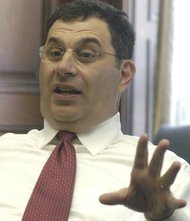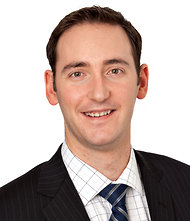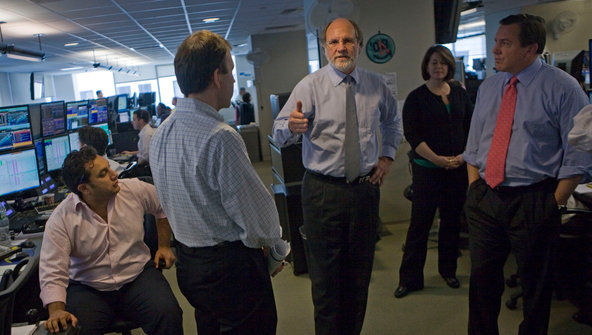 Laura Pedrick for The New York TimesBradley Abelow, chief operating officer at MF Global, has worked closely with Jon Corzine, the chief executive, in different capacities over the years.
Laura Pedrick for The New York TimesBradley Abelow, chief operating officer at MF Global, has worked closely with Jon Corzine, the chief executive, in different capacities over the years. MF Global Holdings, via Business WireHenri Steenkamp, the chief financial officer at MF Global.
MF Global Holdings, via Business WireHenri Steenkamp, the chief financial officer at MF Global.
8:57 p.m. | Updated
Jon S. Corzine bore the brunt of public fury last week when Congress began examining the downfall of MF Global. Now, two of Mr. Corzine’s former top deputies at the brokerage firm are entering the spotlight, as lawmakers demand answers about an estimated $1 billion in customer money that vanished during MF Global’s final days.
Bradley Abelow, MF Global’s chief operating officer and Mr. Corzine’s chief of staff when he was governor of New Jersey, and Henri J. Steenkamp, the firm’s chief financial officer, are set to testify before a Senate committee on Tuesday.
While Mr. Corzine’s prominence on Wall Street and Washington has so far overshadowed the crucial role the other two men played at MF Global, the latest Congressional hearing will widen the focus on them.
Both Mr. Abelow and Mr. Steenkamp are expected on Tuesday to distance themselves from the missing customer cash, saying they know nothing of its whereabouts, according to copies of their prepared testimony before the Senate Agriculture Committee. Their remarks will largely echo statements made on Capitol Hill last week by Mr. Corzine, the firm’s former chief executive, who will also appear at the hearing on Tuesday.
“I am deeply troubled by the fact that customer funds are missing, and I can assure you that I share your interest, and the public’s interest, in finding out exactly what happened,” Mr. Abelow is expected to say in his statement. “At this time, however, I do not know the answers to those questions.”
In his prepared testimony, Mr. Steenkamp is expected to say, “I am deeply saddened, upset and frustrated that money belonging to MF Global Inc.’s customers has been frozen or is missing.”
At MF Global, Mr. Steenkamp was considered a wunderkind. At 35, he was a rookie among Wall Street chief financial officers, a demanding position that is often reserved for polished professionals. Earlier this fall, a trade magazine named him to its “40 Under 40” list of up-and-coming young financiers.
He came to MF Global’s predecessor company, Man Financial, in 2006 as vice president of external reporting, after roughly an eight-year stint at PricewaterhouseCoopers, the accounting firm. Mr. Steenkamp rose quickly, becoming the firm’s chief accounting officer and helping lead it through its initial public offering of stock in 2007.
This year, Mr. Corzine tapped Mr. Steenkamp for the role of chief financial officer, citing his “achievements during his five years at MF Global — including his role in helping to build our global finance and reporting operations.” For Mr. Steenkamp, a native of South Africa who kept a framed rugby jersey emblazoned with MF Global’s logo on the wall of his office, it was a standout offer in a young career.
In his new post, Mr. Steenkamp oversaw accounting and finances for the firm and its subsidiaries, and played a supporting role to Mr. Corzine. Mr. Steenkamp was rewarded with an annual salary of $500,000 and a discretionary bonus that could have reached as high as $1 million in 2011 had the firm survived, according to a regulatory filing.
Despite his rapid rise, people close to the firm say Mr. Steenkamp remained unflappable, even as the firm spiraled downward. One person recalled that Mr. Steenkamp was “modest.”
Mr. Abelow’s vast experience on Wall Street and in politics balanced out Mr. Steenkamp’s relative youth.
Mr. Abelow, 53, met Mr. Corzine at Goldman. He was named to a coveted partnership spot at the firm, but later left and ultimately rejoined his former boss when Mr. Corzine became governor of New Jersey. Mr. Corzine named Mr. Abelow treasurer of the state, and then his personal chief of staff.
Mr. Abelow later departed public life to help found NewWorld Capital, a private equity firm, before Mr. Corzine, after losing re-election, recruited him to join MF Global. Mr. Abelow was reluctant to take the job at first, people close to the firm say, but relented.
As MF Global’s chief operating officer, he oversaw the firm’s back office, raising questions about whether he should have taken a more active role in curbing risk at the firm.
Neither Mr. Abelow, Mr. Steenkamp nor Mr. Corzine has been accused of any wrongdoing.
Former employees recall Mr. Abelow keeping a low profile, though no one doubted that he was Mr. Corzine’s top lieutenant. He oversaw a wave of cost-cutting at the firm, including scaling back on Bloomberg terminals and discretionary travel. He also had a heavy hand in personnel changes. Mr. Abelow, for a time, approved every hire, including low-level associates and analysts.
Although Mr. Abelow zeroed in on organizational details, he could seem less than precise in his personal life. He resisted wearing ties, and he was often seen around the firm’s office wearing untucked shirts and clothes too big for his frame.
On Tuesday, Mr. Abelow is expected to emphasize his recent efforts to aid MF Global’s trustee, as they reconstruct the bankrupt firm’s books.
“There is no way to turn back time and undo all of the damage caused by the collapse of MF Global, but in the last six weeks, I have worked day and night to reduce costs and maximize the remaining value in the business,” he will say, according to his prepared remarks.
At one point, Mr. Abelow made a $1.5 million salary at MF Global. He is now working for $60,000.
Tuesday’s hearing will represent the return of Mr. Corzine, a former Democratic senator from New Jersey, to the Senate side of the Capitol building. Last week, he testified before the House Agriculture Committee, his first public appearance since MF Global filed for bankruptcy on Oct. 31.
At the hearing last week, Mr. Corzine apologized and told the House committee that he was “stunned” when he learned late on Oct. 30 that about $1 billion of customer money could not be located, a discovery that scuttled a last-minute deal to save the firm.
Azam Ahmed contributed reporting.
Article source: http://feeds.nytimes.com/click.phdo?i=f3a66dd45c9d1782511c65aff111d735
